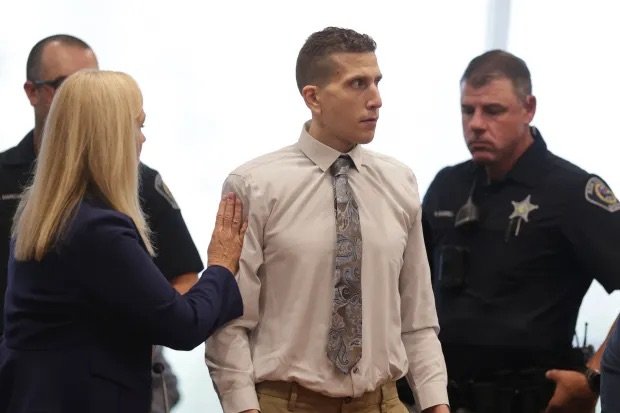“compiled: Elmili TK”
In a courtroom charged with grief and quiet rage, Bryan Kohberger, the man accused of murdering four University of Idaho students in a brutal 2022 attack, pleaded guilty on Wednesday—avoiding a potential death sentence in exchange for life behind bars without parole.
The surprise plea deal ends what was shaping up to be one of the most closely watched criminal trials in recent memory, but it leaves major questions unanswered, including the killer’s motive and the whereabouts of the murder weapon.
Kohberger, 29, a former criminal justice graduate student at Washington State University, admitted to meticulously planning the November 13, 2022 stabbing rampage in a rental house near campus that left Kaylee Goncalves, Madison Mogen, Ethan Chapin, and Xana Kernodle dead. Prosecutors said the attack was calculated for months and involved efforts to destroy evidence afterward.
Guilty—But Silent on Why
Wearing a blank expression, Kohberger confessed to entering the off-campus home through a kitchen door and methodically killing the four students. Prosecutors say he left two other roommates alive, and gave no explanation why.
“This defendant studied crime,” said Latah County Prosecutor Bill Thompson. “He used his knowledge to execute and conceal one of the most horrifying crimes in Idaho’s history.”
Kohberger, who was arrested weeks later at his parents’ home in Pennsylvania, had long maintained his innocence. But his defense team ran out of legal options after failing to suppress DNA evidence and bar the prosecution from seeking the death penalty.
Wednesday’s plea hearing spared Kohberger from trial and execution, instead sentencing him to four life terms with no chance of appeal. The official sentencing is scheduled for July 23.
Courtroom Tension and Family Division
As the judge read the names of each victim aloud and explained the charges, family members wept quietly in the gallery. Some craned to see Kohberger; others couldn’t bear to look.
Judge Steven Hippler emphasized that public opinion would not influence the court’s decision. “This court cannot require the prosecutor to seek the death penalty,” he said.
The families of the victims were divided over the plea deal. The Goncalves family opposed it, arguing that any agreement should have required Kohberger to fully confess and disclose details, including where the murder weapon is. Kaylee’s father, Steve Goncalves, walked out before the hearing began. “I’m just getting out of this zoo,” he said outside the courthouse.
In contrast, the families of Chapin and Mogen expressed support for the agreement, describing it as a painful but necessary step toward closure. “We now embark on a path of hope and healing,” said Mogen’s family in a statement read by their attorney.
New Details, Lingering Mysteries
While the plea hearing revealed some new insights—such as Kohberger killing Mogen and Goncalves on the top floor first before confronting Kernodle and Chapin on the second—critical questions remain unresolved.
Kohberger had purchased a military-style knife and sheath months before the attack. One sheath was left at the scene, matching DNA found later in trash at his parents’ home. Prosecutors said he then bought a replacement sheath, scrubbed his apartment and car, and changed the car’s registration—all in a bid to cover his tracks.
Despite months of investigation, the actual murder weapon has never been recovered.
There is no evidence Kohberger knew the victims. However, cellphone data showed he had visited the neighborhood at least a dozen times prior to the killings. Surveillance footage tracked his car in the area that night.
Justice, but Not Closure
For some, the end of this case brings a measure of justice. For others, it leaves a haunting void.
“We deserve to know when the beginning of the end was,” the Goncalves family wrote in a Facebook post, echoing the unresolved anguish many still carry.
As Kohberger prepares for a lifetime in prison, the community of Moscow—and the families left behind—begin the long process of healing. But the full story of what drove a criminology student to slaughter four strangers may never be fully known.

 English
English



























































